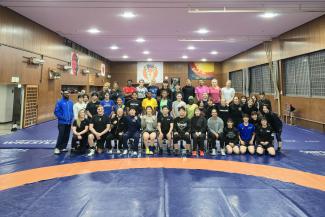Albanian Wrestling Federation working to grow and develop wrestling
Friday, November 18, 2022 - 21:56 By United World Wrestling Press

TIRANA, Albania (November 18) -– The Albanian Wrestling Federation, in partnership with the Albanian Olympic Committee, are working to grow and develop wrestling in their country. After achieving the first gold medal in history of Albania, they decided to organize courses for their coaches and referees to help further their training. The coaches participated in a Level 2 Course from 2-7 October. The referees were originally scheduled to conduct the Introduction to Referee Course during the same week. Due to unforeseen issues, the course was postponed until 3-5 November.
The Level 2 Coaching course was conducted by Mr. Mohamed Abdelfattah (USA/EGY) – UWW Coach Educator and former Olympian. The course had 22 participants (20 men and 2 women). “The participants were very disciplined, excited, and asked questions. It was great to work with the Federation and coaches on their goal to win more medals in the upcoming Olympics.” said Mr. Abdelfattah. The coach participants focused on many topics surrounding the idea of developing training sessions for wrestlers. Some of the topics included coaching the basic skills or wrestling, introduction to performance analysis, theoretical framework to planning, practice plan essentials, strength and conditioning, and nutrition and weight management. During the course, the coaches participated in practical assessments to demonstrate their knowledge. “I want to say that it was a fantastic course something that all the coaches are thankful this opportunity. In particular, I want to thank Mr. Mohamed for doing a wonderful job showing his passion. His knowledge will definitely make us better.” Mr. Sahit Prizreni – President of Albanian Wrestling Federation.
The Introduction to Refereeing course was conducted by Mr. Sherif Halawa – UWW Educator, IS and Olympic Referee. This course had 14 participants (11 men and 3 women). The referee participants focused on skills that would provide a solid foundation as a referee. The areas they focused on were: evaluation of holds, starting and ending matches, referee mechanics, positioning, safety of the athletes, and controlling the bout. The participants learned these areas through theoretical and practical applications. Then at the end of the course, the new candidates refereed their national championships. This allowed them to use the skills that they learned during the course. “I was so happy conducting this course in Albania with those new referees. They are really nice guys and they will be the future of refereeing in Albania and I am sure in the next few years many of them can be international referees.” said Mr. Halawa




Share your thoughts.
Comments